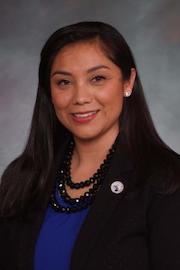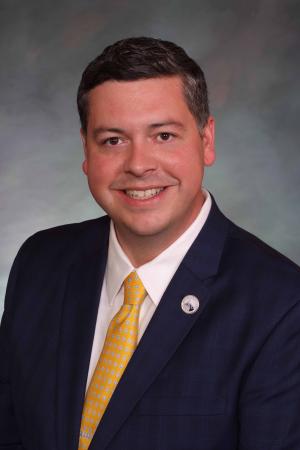North Denver’s state representatives Serena Gonzales-Gutierrez (D – House District 4) and Alex Valdez (D – House District 5) are both serving their 2nd term in the legislature and sat down with The Denver North Star to give an update on the bills they are sponsoring this year. Both highlighted a mix of bills: some from ideas constituents had and others ideas they originated.

Representative Serena Gonzales-Guiterrez
Representative Gonzales-Guiterrez’s bills this session largely focus on criminal justice reform and affordable housing, both issues she’s talked about frequently and draw on her background. The highest profile is probably HB-1117, which concerns a municipalities’ ability to promote the development of affordable housing. Rep. Susan Lotine from SW Denver and two Denver Senators, Julie Gonzales and Robert Rodriguez, are also sponsoring the bill. HB-1117 does not create rent control, she explained; that question comes up from time to time. Instead, it clarifies a city’s ability to promote new affordable developments. After the Telluride court decision that prohibited rent control, other municipal efforts were put into question. “It’s about local control,” she explained. “It gives our local government a tool they can utilize for what their community needs are around affordable housing.” The bill has earned praise from municipal officials, including Councilwoman At-Large Robin Kniech who referenced the bill in her March column in The Denver North Star.
On the criminal justice reform side, Gonzales-Gutierrez is sponsoring several bills. HB-1201 is one that came from a constituent she explained; it could increase family and loved ones’ ability to talk with someone who is incarcerated. A constituent was frequently disconnected when calling an incarcerated family member but still charged for the calls. When they did have a connection, the quality was often poor. The bill requires telecommunications providers to keep records related to the calls quality and costs and submit them for review. If passed, the public utilities commission will also set a maximum rate cost.
HB-1250 clarifies a previous criminal justice reform bill by making body camera usage policies more uniform across different law enforcement agencies. HB-1209 potentially allows people who committed a felony when they were 18-24 to be released after 15 years of incarceration and serving 50% of their term. The department of corrections does, at times, treat younger offenders differently than older ones. Rep. Gonzales-Gutierrez explained “there’s a lot of checkpoints” before anyone is released early and that the bill is about 2nd chances for younger offenders, noting that while 18 is the age of majority, scientific studies increasingly show that the frontal lobe of the brain doesn’t close until someone is 25, which is medically one indicator of true adulthood.
One education related bill, HB-1010, is close to home for her. It creates a study on diversity in education, including why the population of teachers is usually significantly more white than the population as a whole and the students they serve. Gonzales-Gutierrez, who grew up in North Denver, explained she didn’t have a teacher of color until the 6th grade at Skinner and it wasn’t until 8th grade that she had her first Latina teacher. She wants to see “what’s impeding [people of color] from taking the next step” to becoming teachers and whether more can be done to overcome impediments like unpaid student teaching roles, which are often required.

Representative Alex Valdez
Representative Alex Valdez’s bills this session range from environmental to personal data privacy. Possibly the most notable, especially for residents who live near the Suncor facility, is HB-1189. The bill expands detection of toxins in the air near facilities like Suncor, requiring more monitoring, including fenceline monitoring to see what toxins are released into the community and at what levels. Information about dangerous toxins will also have to be released to the community in the two most commonly used languages in the area around a site. Valdez serves as chair of the Energy and Environment committee and has worked extensively in solar. He described the bill as “not popular with industry,” adding “I didn’t run to represent industry.” While the bill doesn’t single out Suncor, the additional sponsorship by North Denver and Southern Adams County Legislators Julie Gonzales, Dominick Moreno, and Adrienne Benavidez, all of whom represent areas around Suncor, is a clear signal of the intent to have more monitoring on the site. Valdez said the legislation will likely affect a handful of facilities across the state.
Another bill getting attention is HB-1162, which aims to phase out single use plastic packaging at restaurants over the next two years. It creates an interim period where restaurants can use existing supplies and creates a small fee system for using recycling paper bags, with the majority of the fees going to the local municipality. Valdez cites the prevalence of microplastics in nearly every ecosystem as the reason to make big changes. Microplastics are miniscule pieces of plastic — often only a millimeter or two — that find their way into the food chain. “We eat a credit card worth of plastic a week,” he explained.
If you’ve ever talked about a product you want with your phone on, see ads for it later that day, and wonder if your phone is listening to you, Valdez thinks HB-1244 is a bill you’ll support. “It’s gotten creepy,” according to Valdez. There’s two elements: when private sector companies collect data like fingerprints and faceprints, they are often selling that data to the public sector, especially law enforcement. Valdez said we “don’t want to create a minority report system,” referencing the 2002 Tom Cruise Film (or 1956 short story by Philip K. Dick, depending on your media preferences). It’s not that he doesn’t think law enforcement should be able to access biometric data, but he said he wants to ensure a judge is still involved in the process. The second part relates to users being able to opt out of their data being shared or sold, noting that signing away data is common on consent forms. “It’s not a huge ask, but it’s critical.” Valdez said the issue was one of the top ones constituents raised recently, especially younger constituents.
HB-1048 is a bill that came from a constituent in the pandemic, requiring most retail businesses to accept cash. Valdez talked to constituents who do not bank, only operate in cash, and were turned away from their local stores. Valdez is sponsoring the measure as both an economic justice and a data privacy measure.
While this session hasn’t been marked by as much bipartisan cooperation as others, Valdez did highlight one other bill carried by him, Adams County Democrat Faith Winter, and two Douglas County Republicans: Senator Jim Smallwood and Representative Kevin Van Winkle. Valdez explained HB-1222 lifts what sponsors consider to be onerous requirements on home child care, benefiting providers and families. It passed on a unanimous vote. “That’s so rare in this building,” noted Valdez.
Senator Julie Gonzales, who represents North Denver in the state senate, did not respond to multiple requests to be interviewed for this month’s issue.

Be the first to comment